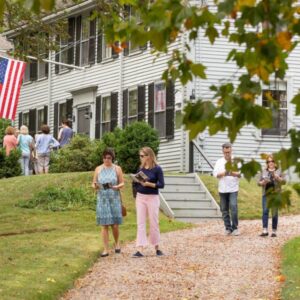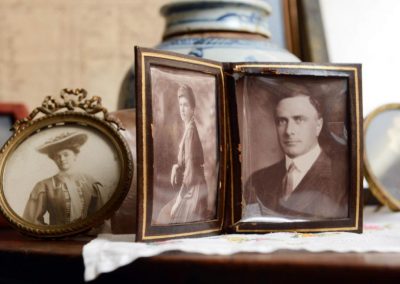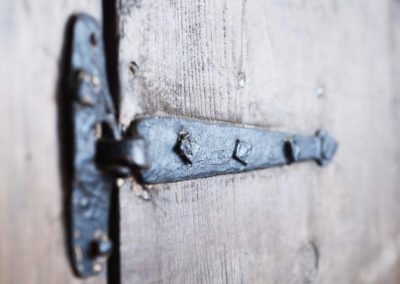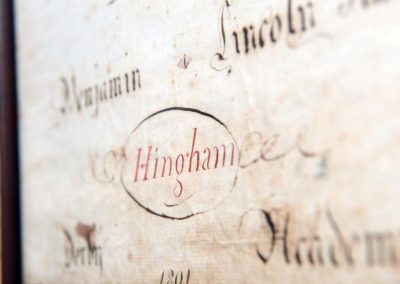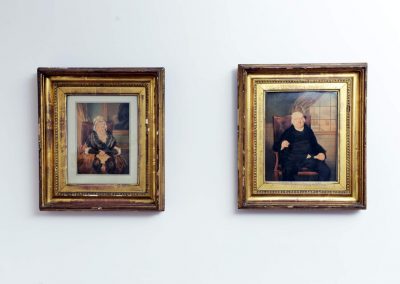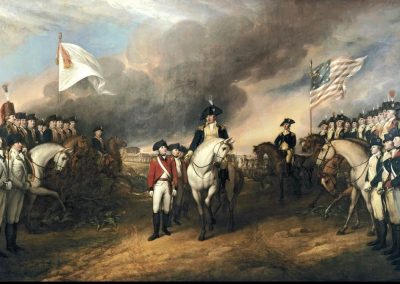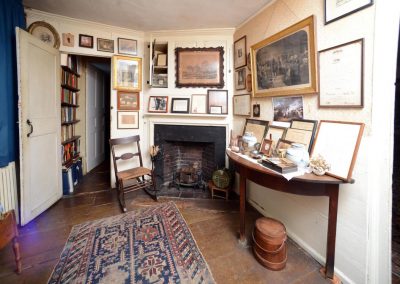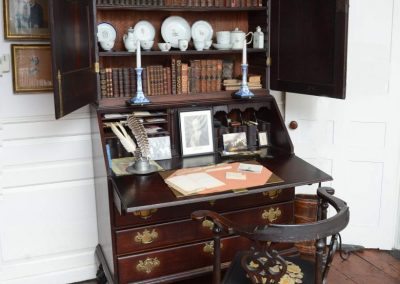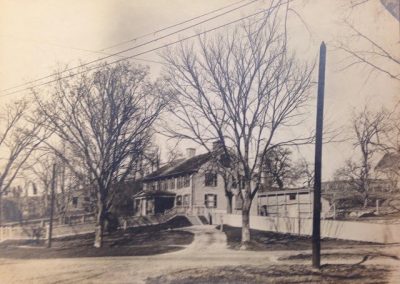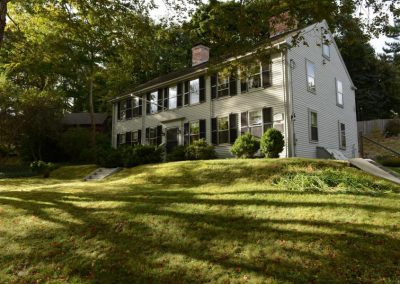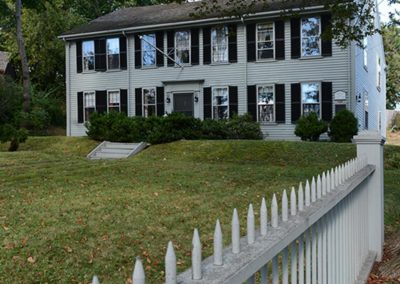
The Benjamin Lincoln House
The Benjamin Lincoln House, at 181 North Street, in Hingham, stands in the heart of one of New England’s most historic towns—as it has for over 350 years. Its most famous resident, Major General Benjamin Lincoln, 1733-1810, was the fourth Lincoln to own the house that his great-grandfather Thomas built around 1665. Remarkably, for an additional seven generations after General Lincoln, spanning another 200 years, the Lincoln family continued to call his house home.
In 2020, after 11 generations and 375 years, the Benjamin Lincoln House was sold to The Hingham Historical Society and in 2021, the majority of the contents of the home were gifted to the Society. We are proud to steward this Hingham town treasure into its fourth century and excited to share with you the American History stories it brings to life. We invite you to join us for a tour and to give charitably to our ongoing Campaign for the Benjamin Lincoln House.
Major General Benjamin Lincoln
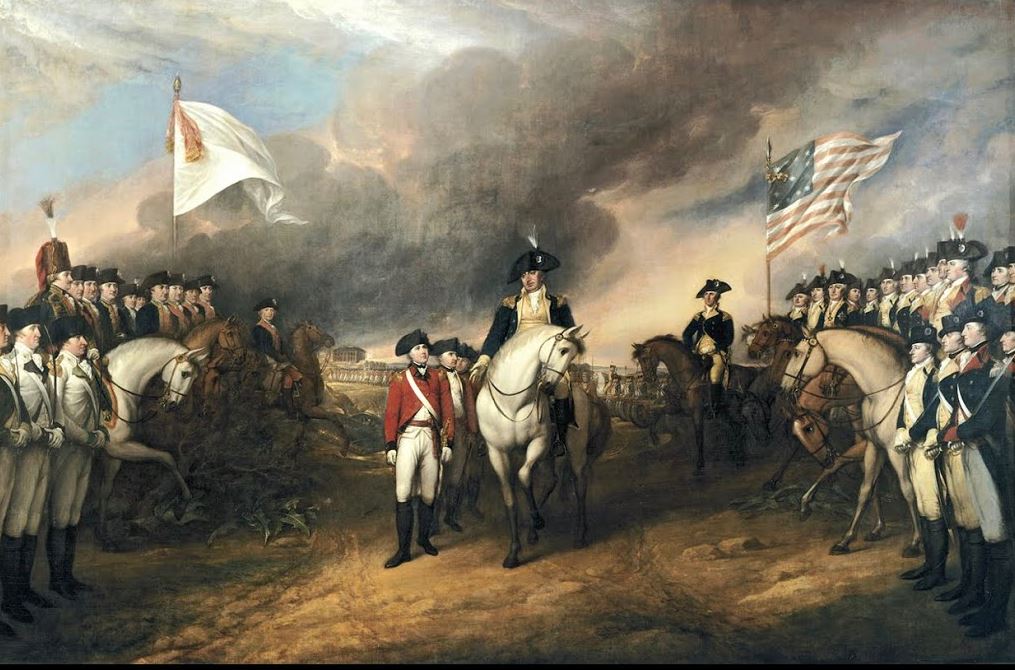
A veteran of the three principal Revolutionary War campaigns at Saratoga, Charleston, and Yorktown, Major General Benjamin Lincoln accepted the British sword of surrender at Yorktown, ending the hostilities during our War of Independence. It is General Lincoln who sits on a white horse, presiding over the surrender ceremonies in the iconic Jonathan Trumbull painting in the Capitol rotunda in Washington, D.C. The Confederation Congress later appointed him the nation’s first Secretary of War.
While Lincoln’s contributions to our nation’s birth are alone a sufficient reason to preserve his lifelong home, his contributions to his home town are almost as noteworthy. He was born, raised, and died in Hingham—all in the house at 181 North Street, and for more than 50 years, he was the dominant figure in Hingham’s public life. Selectman, Town Clerk, and representative to the provincial legislature, he was also deacon and clerk of the Old Ship Church, a founding member of Hingham’s Third Parish (New North Church), a founding trustee of Derby Academy, and a colonel in the Hingham militia.
350 Years of the Lincoln Family
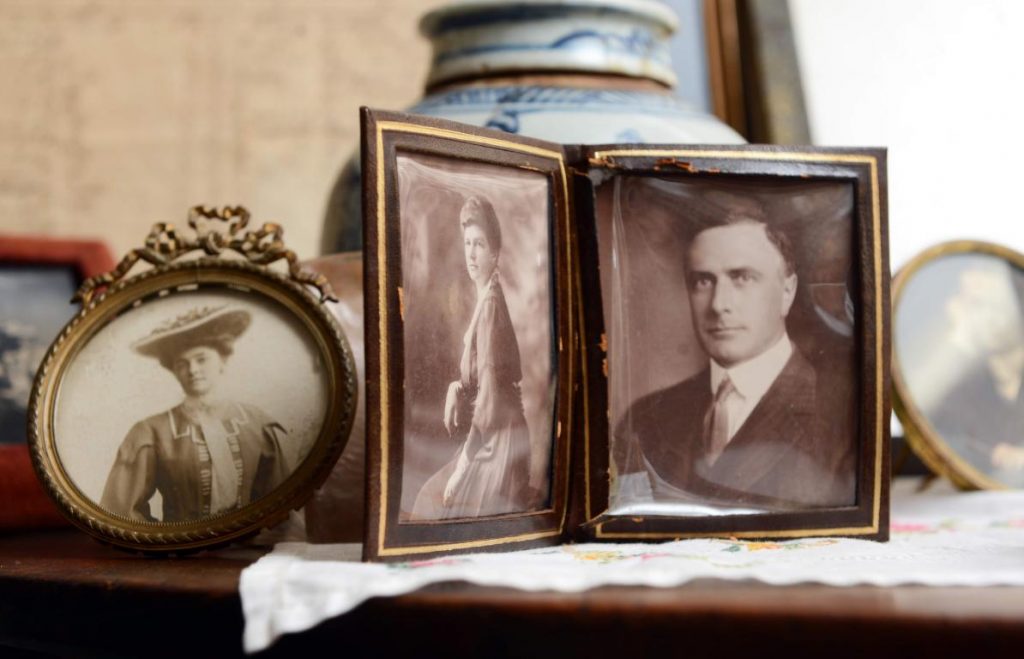
The Lincoln Family at the Benjamin Lincoln House: Line of Ownership by Ellen Stine Miller
The property at North and Lincoln was granted by the town to Thomas Lincoln in compensation for a highway built through his home lot. The lot was given by Thomas Lincoln to his youngest son Benjamin Lincoln I who built the home there in 1667. He resided on “North, corner of Lincoln.” The next three generations of Benjamin Lincolns, the last Benjamin being the General, continued to reside on this homestead. The home passed by will from General Benjamin Lincoln IV on his death in 1810 to his son Martin. Note that Martin outlived all of his siblings except Theodore, who lived in Maine. The will of Martin Lincoln was not available online, but following his death in 1837, taxes were paid by his widow, Lydia Lincoln, in 1850 and 1860. An 1873 map showed the property as belonging to the M Lincoln heirs. Ann Storrow Lincoln was one of the unmarried daughters who lived in the house with her mother. Following Lydia’s death in 1863, Ann Storrow Lincoln came into possession of the homestead. In 1877 when all of her siblings except the two youngest, Benjamin Lincoln and Sarah Lincoln Crosby, were deceased and none had heirs except Sarah Lincoln Crosby, Ann wrote a will which left the use of the house to Benjamin during his lifetime, and then provided that the house would pass to the children of Sarah, namely Elizabeth Crosby, Helen Crosby, Samuel Crosby Jr, and Clara Crosby Bryant. Siblings Benjamin and Sarah predeceased Ann in 1884 and 1889 respectively. Ann paid taxes in 1890. She died in 1895. Samuel T Crosby Sr, widower, moved into the homestead shortly after the death of his wife Sarah Lincoln Crosby in 1889. Samuel was joined briefly by his daughter Helen B Crosby. Samuel died in 1907. During this time period the homestead continued to be shown in tax records as part of the estate of Ann S Lincoln. After the death of Samuel T Crosby Sr, his unmarried daughters Elizabeth L Crosby and Helen B Crosby, began to live in the house together. Clara M Crosby Bryant was widowed in 1913 and also moved in. She died in 1934 leaving two living children, Eugene and Ethel. Elizabeth L Crosby never married and died in 1927. Samuel T Crosby Jr married but had no children; he died in 1927 Helen B Crosby never married and died in 1952, having paid taxes on the property since 1931. After 1952 the only living heirs to the original estate of Ann S Lincoln were the two living children of Clara M Crosby Bryant, namely Eugene Lincoln Bryant and Ethel Mae Bryant Scaife. Eugene Bryant was the paternal grandfather of Rose Bryant Woodard the most recent Lincoln to occupy the home. Ethel M Bryant Scaife was the maternal grandmother of Franklin Spencer Beveridge. Ethel Mae Bryant Scaife’s daughter Elizabeth Scaife Beveridge began living in the house in 1947 with Helen B Crosby; Following 1952, Elizabeth S Beveridge continues to live in the house, at times with her three children Albert, Elisa and Franklin Beveridge until she died in 1998. Starting in 1957 the taxes were paid by John W Bryant, et. al.; he was Rose Bryant Woodard’s father, nephew of Ethel M Bryant Scaife who died in 1959. Elizabeth S “Skiffy” Beveridge died in 1998. John W Bryant died in1999 in Manchester-by-the-Sea. John’s daughter Rose and her husband Charles Woodard moved into 181 North after “Skiffy” Beveridge. In 2019, Rose and Franklin were co-owners of the Benjamin Lincoln homestead.
Quick Facts: The Campaign 2019-present
In 2019, the Society reached an agreement with the owners of the Benjamin Lincoln House to purchase the property for its assessed value, contingent upon our ability to raise both the purchase price and a $1 million endowment needed to fund maintenance expenses. In order to give the Society time to raise the purchase price and endowment, the owners took the property off the market until September 1, 2020. The Society immediately began actively raising private leaderships gifts from local prospects and planned to launch a public fundraising campaign in March 2020 to the larger Hingham community and pursue regional and national donors committed to the preservation of American History. The COVID-19 pandemic interrupted a more formal public campaign which is why the Society considers the Campaign for the Benjamin Lincoln House ongoing.
The Society submitted an application to the Town of Hingham’s Community Preservation Committee (CPC) to fund the purchase price of the home In October 2019. The Town of Hingham’s CPC annually reviews applications submitted by Town bodies and civic organizations for funding projects involving the acquisition of open space/recreation, the support of low income housing and preservation of historic resources and makes recommendations to Town Meeting regarding the use of the Town’s community Preservation Fund for those purposes. The Community Preservation Fund is composed of a 1.5% surtax in Town Real estate taxes and state matching grants.
During the application process, the Society made two public presentations and met with town officials as requested. The Society provided tours of the property to CPC members, the Board of Selectmen, the Town’s Advisory committee and the Department heads of the town’s permitting bodies. The CPC recommended to 2020 Town Meeting a $772,000 grant towards the purchase price of the home. This recommendation was unanimously supported by the Board if Selectmen and the Advisory Committee and approved by Town Meeting (which was delayed by the COVID19 pandemic) at the end of June 2020.
Book a Tour
4/19 Tours are Free – In celebration of the the 250th anniversary of Concord and Lexington.
Tours are offered Tuesdays – Saturdays.
The Benjamin Lincoln House is ADA accessible through the front entrance, however please be advised certain portions of the house museum have limited or no accessibility due to the preservation of the historic structure and landscape. Handicap parking available on site.
National Feedback
The Hingham Historical Society benefited from the input of the Nation’s leading historic preservation and museum professionals as we sought to acquire, preserve and open the Benjamin Lincoln House as a house museum. Here is what they had to say:
During the past two days our four-person team has examined the house in great detail. It is an exceptionally interesting property that merits its status as a National Historic Landmark, the Nation’s designation for properties of exceptional importance; only a few buildings and landscapes in Massachusetts have earned this status in a program administered by the National Park Service. The building is significant to the nation’s history not only because of the role General Lincoln played during the American Revolution, but also because it allows people to study how Lincoln family members lived over the course of 300 years.
J. Ritchie Garrison, Director, Winterthur Program in American Material Culture, University of Delaware
I don’t think the importance or the complexity of the Benjamin Lincoln House can be overstated. Even in our too-brief visit, it’s clear that it has much to teach us (or me, at any rate) about the early history of Hingham, the south shore, and colonial-era New England, generally.
Jeffrey Klee, the Shirley and Richard Roberts Architectural Historian. Colonial Williamsburg Foundation


